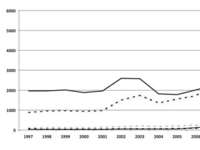Read more about The National and the International

The Challenge of Internationalizing Sociology
by Eloísa Martín
February 15, 2013
What is the state of sociology in the United States? In 1994, when I migrated from New Zealand to Alabama, USA, I heard that sociology was in decline. The University of Alabama’s PhD program in sociology had recently been abolished because faculty members had been fighting among themselves and the administration had sought resolution by shutting it down. A minor in sociology was folded into the Department of Criminal Justice, where I am presently employed. Since then, talk of reconstituting a sociology department has gone nowhere and the sociology minor suffers from insufficient course offerings to maintain viability or to foster growth. The outlook is not bright in my part of the United States.
I did not consider what was happening in the larger sociological sphere until I read this sentence in Benjamin Ginsberg’s 2011 book The Fall of the Faculty: The Rise of the All-Administrative University and Why It Matters: “Precisely this fate [closing down] has befallen a number of academically well regarded sociology programs around the nation in recent years as student interest in the field has all but disappeared” (104).
Ginsberg’s broad claim about the demise of sociology led me to consult the American Sociological Association’s (ASA) website for information on disciplinary trends at US colleges and universities. The data indicated that the number of baccalaureate and master’s degrees almost doubled between 1990 and 2004. An ASA update for 2001 to 2007 showed continued growth at most universities and colleges (Spalter-Roth, 2008). The number of freestanding sociology departments also increased, perhaps in response to an expanding student population.
The ASA reported three caveats to this recovery. First, doctoral degrees did not keep pace with these upward trends, and even declined in the early 2000s before staging a modest recovery. Second, concentrations in criminal justice gained ground at the expense of traditional sociology. Third, fewer tenure-track faculty members are being hired to teach these students. Part-time and full-time instructors are being employed instead as universities seek to contain costs and maximize profits, a national trend that affects other disciplines as well (Wilson, 2010).
The modestly optimistic picture in ASA reports can be contextualized within broader trends in US sociology. The figure indicates that the 1970s were a zenith for the discipline as sociology departments and programs were established or expanded nationally. However, by the 1980s, sociology appeared to fall off a cliff with enrollments and degrees declining so precipitously that many writers predicted the end of sociology (Summers, 2003). Dunlap and Catton (1994: 11) attributed the doldrums of the 1980s to resurgent free market fundamentalism and, as a related matter, to the Reagan administration’s “severe attacks” on the social sciences that led to waning student interest in sociology. The decline was so steep that sociology has yet to fully recover or even keep pace with population growth in the United States.
Ginsberg might be correct about the lack of interest in sociology but I suspect that something else is at work here – students are being encouraged to enroll in majors that will land them a job in a shaky recovery. Once again, there is a general trend toward professional rather than academic degrees, perhaps for economic rather than ideological reasons. The first question that any student asks me about a career in sociology is “But what can I do with it?” I usually say, “Plenty” and explain why a sociology degree is useful. But given my own experience of teaching in a sociology program whose viability is doubtful, I have to wonder.
A few years ago, I surveyed 1,000 undergraduate Criminal Justice and Sociology students about whether or not a major in sociology should be offered at the University. The emphatic answer was yes. Perhaps the lack of interest is not so much on the part of students as from parents and influential others who believe that a business, engineering, nursing, or teaching degree is more valuable and will lead to a well-paid job. Either way, sociology is still viable in 2012. We may never achieve the heights of enrollment currently enjoyed by professional degree programs, but traditional sociology has its place in critical thinking, social analysis, and broader cultivation for a well-educated and thus employable citizenry. I am hopeful that trends in sociology will swing our way once an appreciation for academic education over strictly utilitarian skills finds a comeback in US society.
References
American Sociological Association (2012) “Research on Sociology: Sociology Degrees Awarded by Degree Level 1966-2010.” Retrieved November 29, 2012 (http://www.asanet.org/research/stats/degrees/degrees_level.cfm).
Dunlap, R. E. and Catton, W. R. Jr. (1994) “Struggling with Human Exemptionalism: The Rise, Decline and Revitalization of Environmental Sociology.” The American Sociologist 25(1): 5-30.
Ginsberg, B. (2011) The Fall of the Faculty: The Rise of the All-Administrative University and Why It Matters. New York, Oxford University Press.
Spalter-Roth, R. (2008) “What Is Happening In Your Department? A Comparison of Findings from the 2001 and the 2007 Department Surveys.” Washington, DC: American Sociological Association. Retrieved December 10, 2012 (http://www.asanet.org/images/research/docs/pdf/Whats%20Happening%20in%20Your%20Dept.pdf).
Summers, J. H. (2003) “The End of Sociology?” Boston Review 28(6). Retrieved December 10, 2012 (http://bostonreview.net/BR28.6/contents.html).
Wilson, R. (2010) “Tenure, RIP: What the Vanishing Status Means for the Future of Education.” The Chronicle of Higher Education. Retrieved December 10, 2012 (http://chronicle.com/article/Tenure-RIP/66114/).
Bronwen Lichtenstein, University of Alabama, Tuscaloosa, USA, and President of RC49 (Sociology of Mental Health)
This issue is not available yet in this language.
Request to be notified when the issue is available in your language.
If you prefer, you can access previous issues available in your language:














